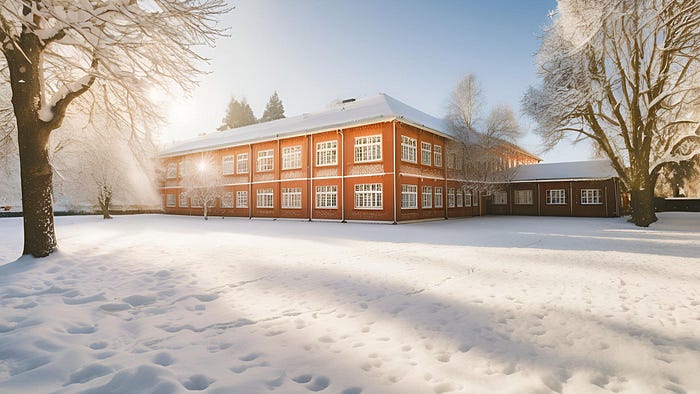Could Snow Days explain why the Patronage Model doesn’t work?

This week, schools across Ireland faced widespread closures due to snow. While many children were happy to have a surprise extension to the winter break, it was frustrating for many people who saw the roads clear from ice and snow up until the gates of the school, and wondered why on earth nobody driving the gritting machines and salt trucks wouldn’t have taken a short diversion into the grounds to allow them to open.
At the heart of it all, in my view, lies a structural issue that I believe is central to everything wrong with the Irish education system: the patronage model. When the patron model is spoken about, it often centres on religious division and control, but to me it encompasses absolutely everything.
In my view, the patronage system fragments control and accountability, and I’ll try and explain how it has left schools isolated in decision-making processes and made the bad weather even harder to deal with.
Under the patronage system, every school, whatever its denomination, operates as its own “fiefdom,” with no centralised body to coordinate decisions. While local councils manage public services like clearing snow from main roads, they have no say over school grounds. This is because schools are not under the control of local authorities or, as many people don’t realise, the Department of Education. Instead, the Department of Education have created a multifaceted buffer system where they have no responsibility for what happens in any particular school. They outsource some responsibility to patron bodies, who focus mainly on enforcing the school’s ethos and religious or philosophical identity. However, these patron bodies don’t actually control the running of schools, leaving day-to-day decisions — including closures — to individual Boards of Management. Technically a patron body can dissolve a Board of Management, but this is incredibly rare.
To complicate things further, Boards of Management are made up of eight volunteers, usually without professional expertise in facilities management, health, or safety. They are generally well-meaning people within the community that want to support the school, either because they are a parent or because they have some personal connection to the school. Therefore, they generally pass almost all operational responsibilities to the school principal, who is left to make big decisions with little guidance or support. This puts an enormous burden on principals, who are already busy managing their schools’ daily operations.
While efforts over the last two decades from professional bodies like the Irish Primary Principals’ Network have tried to create collegial support groups between schools, the structures of the patronage system mean that every school in the country are in competition with each other for limited resources. The Department of Education funds schools based on how many children enrol in the school. Furthermore, the number of teachers that a school can employ also depends on the number of children enrolled in a school and it operates on a cliff edge. If your school doesn’t have the required number of pupils by the 30th September every year, you lose a teacher. This means that every decision a principal makes can make them more attractive or less attractive to prospective families who have free choice as to what school they will send their child. This variable of free choice adds to this pressure and every decision made by a principal can have serious consequences. A good example of this is the SET Allocations Model, which I’ve written about previously.
Principals, despite facing the same challenges, often feel like they’re competing for community approval and student enrolment. When it comes to snow closures, this competition can lead to bad decisions. While the first couple of days, neighbouring schools will work together, after a while when the first email comes asking will the days be made up or when asked if they’ll be providing online learning, a principal can start to feel anxious and do their own thing to ensure their own survival. Time and time again we see it when it comes to competing resources.
For example, when Norma Foley announced a STEM grant in 2023 for up to €10,000 per school, thousands of schools applied for the grant. It turned out that so many schools applied for the grant that the Department based their decision on the grant by lottery. A study from the National Principals’ Forum found that while 91% of principals said they were unhappy with the process, of the schools that were successful fewer than half said the process was unfair.
When it came to the next random grant, despite there being wide agreement that schools should not buy into this scheme, several primary schools still went ahead and applied. It could only be seen as a fingers’ up to their colleagues.
If you’re not convinced, you only have to look around the periphery of towns in Ireland throughout enrollment season and schools are printing road signs urging families to choose their school over a neighbouring school. There is no regard for the neighbouring school that might lose a teacher. It’s dog-eat-dog.
When it comes to the snow, and the fact that the decisions are left to individual principals, all it takes is for one principal to break rank. It might be that one principal decides to make the call to close the school a little earlier than the others. It might be that one school might decide to try and open their school, even if it’s not safe, to avoid looking less committed. This creates mistrust and the fragmented approach stops schools from working together and making decisions that are best for everyone. It’s not the principals’ faults; the structure of patronage means that every school is always in competition with each other to lure parents. And while choice is almost always explained in terms of religion, it much more complicated than that. In any town there may be half a dozen Catholic schools but that doesn’t mean that everyone that wants a Catholic school goes to the Catholic school nearest their home.
For me, the solution is simple. We need to move away from the patronage model to a centralised system like local education authorities. These organisations, used in other countries, have the knowledge and resources to make better decisions about school closures. With control over all schools in a region, local authorities could, in summary:
- Coordinate Closures: Make sure all schools in an area follow the same decision, so it’s fair and consistent.
- Clear Snow: Use gritters and snow-clearing equipment to make school grounds safe, fixing the current problem where roads are fine but schoolyards are dangerous.
- Provide Expertise: Give principals and Boards of Management professional advice on health and safety, so they’re not left guessing about what to do.
However, beyond snow, they can provide schools with adequate resources like IT equipment, school meals, and they can even allocate children to their nearest school without the risk of schools losing teachers. The local education authority can allocate teachers to different schools in an area and teachers could move to different jurisdictions without having a new contract every time they move.
The lack of a central system shows how inefficient the patronage model is. Local councils have the tools to clear snow, but they can’t use them on school grounds. This gap leaves schools stranded, unable to ensure the safety of students and staff during bad weather.
It’s unfair to expect individual principals and Boards of Management to handle decisions that require professional expertise and coordination. But under the patronage model, that’s exactly what happens. This system fragments control and accountability, and it’s no wonder schools struggle in situations like this week’s snow closures.
If we want a better education system, we need to fix the problems caused by the patronage model. Setting up local education authorities would give schools the support they need to face challenges together, not alone. It would mean decisions about closures are based on safety and common sense, not competition or reputation.
When the snow finally melts, the bigger problem won’t have gone away. We need to leave the patronage model behind and create a modern, centralised system that puts the safety of students and staff first, but also ensures that schools are no longer in competition with each other and can truly work together with collegiality.
